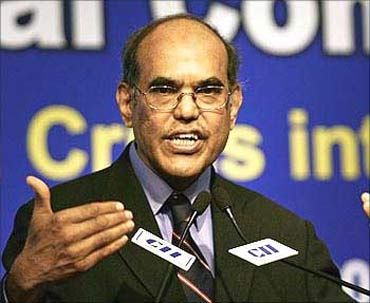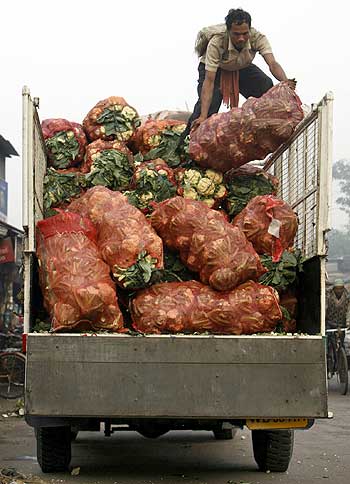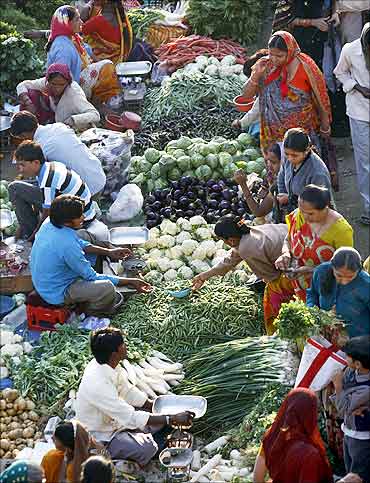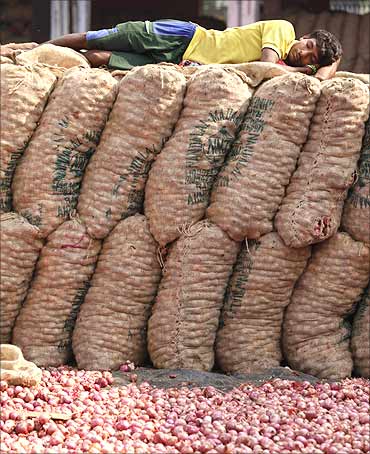Photographs: Reuters T N Ninan
No one should cavil at the new repo rate of 7.25 per cent (up from 6.75 per cent earlier), since inflation is at 9 per cent.
Still, in a week when the Reserve Bank of India has said that combating inflation is now its primary focus, it is important to ask: is RBI fighting yesterday's war, instead of peering into the future to glean what might be coming -- as monetary policy is supposed to do?
Rewind to where the inflation debate started. From the middle of 2009-10, sundry government spokesmen predicted that the year would end with 5 per cent inflation. It wasn't to be.
Then they switched to making the same forecast for 2010-11. Several reasons were given for the expected drop in inflation: a high base effect would kick in, a good harvest was coming, and so on. None of it made a difference.
. . .
Is RBI fighting the wrong war?
Photographs: Reuters
Last year, wholesale price inflation was 9 per cent, and the year before 10.2 per cent. Retail price inflation was comparable, if not worse (8.8 per cent and 14.9 per cent).
Forecasting is a hazardous business, especially about the future, as a rueful Dr Subbarao wisecracked the other day.
So if you were to ask why RBI and the government got their inflation numbers way off track, the truth is that no one could have seen that international oil prices would treble in the last two years, from $40 per barrel to $120.
Or that global commodity prices as a whole (including oil) would see an 80 per cent price surge. The domestic backwash was clear too: primary articles went up 22.4 per cent, and fuel and power 13.8 per cent in 2009-10; both went up a further 13 per cent in 2010-11.
. . .
Is RBI fighting the wrong war?
Photographs: Reuters
How could any governor achieve 5 per cent wholesale price inflation in such a context?
Having got it wrong twice, the RBI wants to be third time lucky --except that global commodity prices have just taken a tumble. Oil has dropped below $100, and silver is down 30 per cent. Copper, tin, coffee, cocoa they have all dropped.
From the country demand perspective, China is slowing down and US indicators look shaky. As for the domestic signals, from January 2010 till now, consumer price inflation has virtually halved (from over 16 per cent).
There is more room to fall, but in the most recent months, between November and March, the consumer price index went up from 182 to just 185. So, has the inflation beast already been tamed -- especially if global commodity prices are falling?
. . .
Is RBI fighting the wrong war?
Photographs: Reuters
And if so, is the anti-inflation thrust in danger of curbing growth?
Note that the index of industrial production for the latest four months (till February) has shown average annual growth of less than 3 per cent.
Despite the surge in commodity prices last year, import growth was just 17 per cent. Discounting for the price surge (think oil and commodities), import growth would have been in the low single-digit region -- pointing to a lack of domestic demand.
If you look at sectors, the demand for capital goods has already slowed. With higher interest rates, the demand for consumer goods should slow too.
. . .
Is RBI fighting the wrong war?
Photographs: Reuters
And the government has become less of a spendthrift; with lower deficit numbers, it is no longer pumping up demand as it was doing through 2008-11 (a period in which 43 per cent of the increase in money supply was accounted for by fresh credit to the government!).
Finally, agricultural growth this year is likely to be modest, since it comes on top of a good harvest last year.
In short, you might be lucky to get even the lower 8 per cent GDP growth that is now forecast.







article